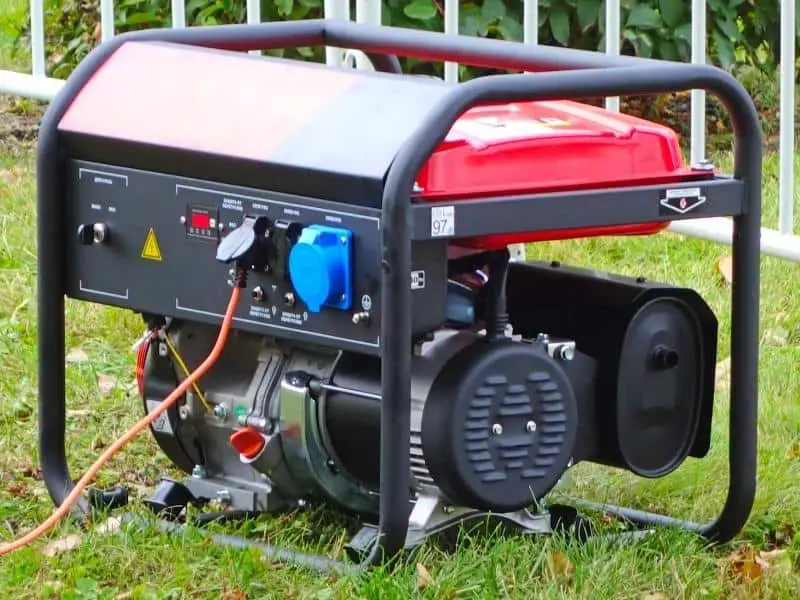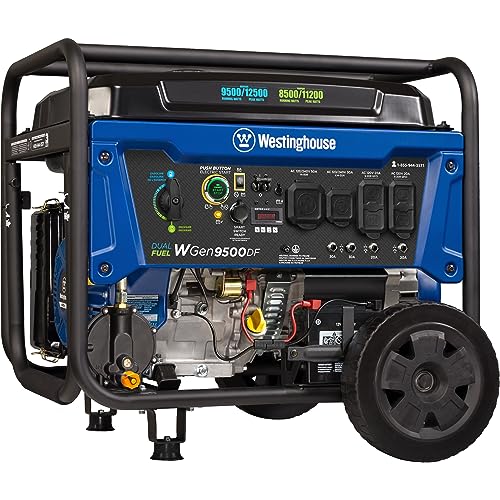If you’re in the market for a propane generator, you’ve got a lot to consider. One is the versatility of your equipment: can it run on multiple fuel sources including natural gas, or is it strictly limited to propane?
A few key points we’ll cover:
• What Is Propane
• How Propane Generators Work
• Benefits of Propane Generators Over Diesel and Gas
• Propane Generator Running on Natural Gas
• How Conversion Kits Work
Before getting into whether a propane generator can run on natural gas, let’s first briefly survey what propane is and how propane generators work.

What Is a Propane?
The fuel source for propane generators is the flammable hydrocarbon gas known as, of course, propane. The gas is also alternatively known as liquefied petroleum gas (LPG).
Propane is colorless, odorless, and nontoxic. Most propane formulations sold in the United States have an added odor identifier to alert users to its presence in order to prevent accidental ingestion, fires, and other safety reasons.
The common uses of propane are for water and space heating, as fuel for engines in forklifts, farm irrigators, etc., and for cooking.
Enterprising scientists consistently engineer new technological applications for propane, so this is by no means an exhaustive list of its many uses.
How Does a Propane Generator Work?
When the generator powers on, it heats and burns the propane gas, which generates energy and heat. Inside the generator, water and ammonia are heated by the burning propane.
This heating action produces ammonia gas, which then flows through the generator.
What Are the Benefits of Propane Generators Over Diesel and Gas?
Many people prefer propane generators over their more conventional diesel or gas-powered counterparts for a variety of reasons. One is that, in the instance of natural disasters that interrupt supply lines, there is no reliance on non-portable gas lines.
Another benefit is that, unlike gas, propane has a lengthy shelf-life and does not deteriorate as rapidly. Propane is also easier and safer to store than gasoline.
Lastly, as we will explore more later on, propane is safer for the environment.
Propane generators are particularly useful for rural dwellers who lack consistent access to power grids or who may have none at all.
These devices are popular with survivalists and other groups who practice living “off the grid” – in this case, quite literally off of the electrical grid. In the event that it goes down and the world goes full “Mad Max,” your trust propane generator will still be by your side.
Even if you don’t have fear of a looming apocalypse, though, a propane generator can be a solid addition to your preparedness arsenal to help shepherd you and your family through a natural disaster that could potentially shut the power down for an extended period of time.
You never know when a propane generator might come in handy.
The Environmental Impact Benefit of Propane Generators
The 1990 Clean Air Act designated propane an “approved clean fuel.” It produces significantly fewer carbon emissions than gasoline and diesel.
Also, propane puts off less toxic carbon monoxide, which, in addition to harming the environment, can also result in sometimes-fatal poisoning when inhaled.
In fact, according to the CDC;
- “at least 430 people die in the U.S. from accidental CO poisoning”
- “approximately 50,000 people in the U.S. visit the emergency department each year due to accidental CO poisoning.”
So, that alone is a good reason to tip the scales alone in propane’s favor.
Many analysts have referred to propane as a viable “bridge fuel” because it can serve as an ideal alternative to gasoline while we transition away from petroleum.
The long-term plan is to utilize renewable, abundant, clean fuel sources like the sun, air, and water to meet our energy demands, but, in the meantime, we can settle on propane as a cleaner-burning fuel compared to gasoline or diesel.
What Is Natural Gas?
Natural gas, like other fossil fuels, formed over millions of years deep within the surface of the Earth. It is composed of many compounds, the largest of which is methane.
In addition, other components of natural gas include natural gas liquids (NGLs) and nonhydrocarbon gases like water vapor and carbon dioxide.
Drillers harvest natural gas in a manner similar to other fossil fuels. In addition, natural gas deposits often exist side-by-side with crude oil.
Industrial applications of natural gas are wide-ranging and include the production of hydrogen, fertilizer, and chemicals, as well as, of course, as a fuel for process heating.
Propane vs. Natural Gas: What’s the Difference?
Contrary to popular belief, natural gas processing actually produces propane as a byproduct, so molecularly, the two substances are very similar.
However, there are important differences between them to consider.
Propane vs. Natural Gas: Portability and Availability
First, propane is portable and widely available in propane tanks that can be delivered to rural areas. On the other hand, natural gas is most commonly supplied through gas lines.
In some ways, natural gas pumped in through land lies might be more convenient because it is always available; however, in inclement weather events or due to other circumstances, the supply might dry up.
Again, that’s why survivalists tend to prefer propane.
Propane vs. Natural Gas: Cost Effectiveness
As a general rule, propane is more expensive than natural gas. However, it produces about twice the amount of energy output, so it’s actually more cost-effective.
In rural areas, both are usually more affordable and economical than electricity.
Can a Propane Generator Run on Natural Gas?
Now, we arrive at the ultimate question: can a propane generator run on natural gas?
Some generators run on only natural gas.
However, many specialized propane generators can run on either propane or natural gas. Some even also have the capacity to run on gasoline or diesel.
Generators that can utilize natural gas and propane are called “dual-fuel” generators. Those that can also run on gasoline are called “tri-fuel” generators.
- 9500 Running Watts and 12500 Peak Watts (Gasoline); 8500 Running Watts, 11200 Peak Watts (Propane); Remote Start With Included Key Fob, Electric...
- Features Two GFCI 120V 5–20R Standard Household Receptacle, One Transfer Switch Ready 120V L14-30R, and One RV Ready 120/240V 14–50R; All...
- Powered by a Heavy Duty 457cc Westinghouse 4-Stroke OHV Engine Featuring a Long-Lasting Cast Iron Sleeve With Automatic Low Oil Shutdown and...
Many portable generators are mix-use and very few are designed only for natural gas, given the difficulty of locating a natural gas hookup on the move out in the world. Increasingly, industrial-scale generators also have the capacity to switch fuels.
How Do Conversion Kits Work
“Conversion kits” can transition propane generators to run on natural gas. The benefit of keeping a conversion kit handy is that you can utilize natural gas when you have a connection available and then switch back to propane whenever you are on the go and a natural gas connection is unavailable.
In this way, you can strategically preserve your propane supply to only use it when you don’t have other options available.
- Tri-Fuel Conversion kit
- Run on high pressure propane, low pressure propane, low pressure natural gas or gasoline
- Unique venturi design allows for installation without modification on most generators
Conversion kits are widely available for sale. Also, tutorials on the web can teach you how to make a DIY conversion kit – although this is not recommended unless you’re really handy.
Sources
- https://www.eia.gov/energyexplained/natural-gas/
- https://mechanicology.com/fuel-conversion-kits-generators-benefits-how-work
- https://afdc.energy.gov/fuels/propane_basics.html
- https://www.cdc.gov/nceh/features/copoisoning/index.html







